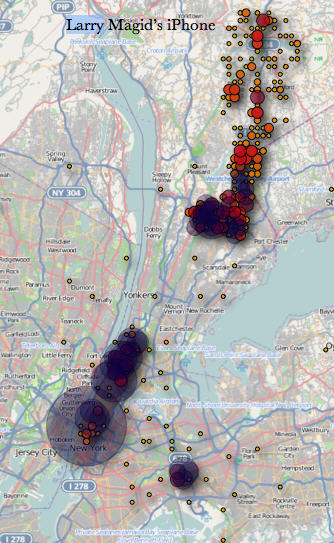Last Thursday I took the 4:00 PM Megabus from Boston to New York. I knew where I was going as did a few of my friends. AT&T has a record of the cell towers I accessed along the way, but they’re not allowed to disclose that information without a court order. However, thanks to a tracking file stored on my iPhone and a recently released piece of software, anyone with access to my phone or my computer can find out exactly where I’ve been.

Tracking software was able to follow me from Boston to New York. The software can zoom in for far more detail
The presence of this tracking file was discovered by researchers Alasdair Allan and Pete Warden who disclosed their findings on the O’Reilly Radar blog and presented them at the Where 2.0 Conference in San Francisco (scroll down for a video of their presentation)
The pair had been working on data visualization projects including creating a map of radiation levels in Japan and were looking into ways to visualize mobile data when they discovered the file. Allan said that he was looking for data on contact information and “I started poking around backups on the Mac and I stumbled across a directory named location d.” He looked around and found a file called “consolidated.db” which was full of latitudes and longitudes and time stamps and cell IDs. “The file,” added Warden “was a plain SQI file” that was not encrypted.”
Allan said that the phone contained “a year’s worth of data for every cell that we’ve been through since we upgraded to IOS 4.” And the data persists even if you change phones assuming you follow Apple’s recommendation to backup and restore your phone to a computer via iTunes.
Free OS X software lets iPhone users create their own maps….
To enable iPhone users to visualize their location data, the researchers created a Mac OS X application called iPhone Tracker that quickly displays your location based on the data from your iPhone backup. Before you download and run the application, you should backup your iPhone via iTunes. To learn more and read more about his experience regarding maps and tracking, click here including the video.

Larry Magid is a technology journalist and an Internet safety advocate. He serves as on-air technology analyst for CBS News, is co-director of ConnectSafely.org and founder of SafeKids.com and SafeTeens.com. He also writes columns that appear on CNET News, CBSNews.com, Huffington Post and the San Jose Mercury News.
His technology reports can be heard daily on CBS News and CBS affiliates throughout the U.S. and he has a daily tech segment on KCBS radio in San Francisco. He’s a regular contributor to BBC World Service and an occasional guest on National Public Radio’s Talk of the Nation. He is often called upon for commentary by CBS television news, CNN and Fox News and has appeared on the CBS Evening News, ABC World News Tonight, the Today Show and CBS Early Show. He has also been a frequent contributor to the New York Times and was, for 18 years, a syndicated columnist for the Los Angeles Times.
He has written several books including the best-selling Little PC Book and is co-author (with Anne Collier) of MySpace Unraveled.
Larry served on the Obama Administration’s Online Technology Working Group and the Berkman Center’s Internet Safety Technology Task Force.








